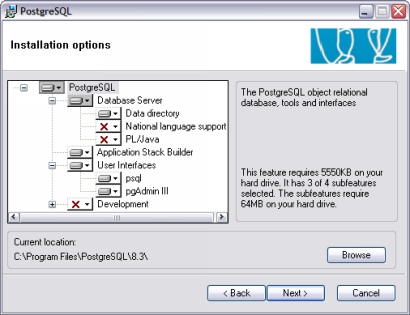 Maandag is versie 8.3 van PostgreSQL uitgekomen. Dit populaire opensource Relational Database Management System draait op op een groot aantal besturingssystemen en is daardoor uitstekend inzetbaar in diverse omgevingen. De broncode is te downloaden op deze pagina en binaries voor Windows kunnen hier worden gevonden. Een uitgebreid overzicht van alle veranderingen in deze release kan in dit document worden gevonden; een samenvatting van de belangrijkste veranderingen staat hieronder:
Maandag is versie 8.3 van PostgreSQL uitgekomen. Dit populaire opensource Relational Database Management System draait op op een groot aantal besturingssystemen en is daardoor uitstekend inzetbaar in diverse omgevingen. De broncode is te downloaden op deze pagina en binaries voor Windows kunnen hier worden gevonden. Een uitgebreid overzicht van alle veranderingen in deze release kan in dit document worden gevonden; een samenvatting van de belangrijkste veranderingen staat hieronder:
Release 8.3
With significant new functionality and performance enhancements, this release represents a major leap forward for PostgreSQL. This was made possible by a growing community that has dramatically accelerated the pace of development. This release adds the following major features:Major performance improvements are listed below. Most of these enhancements are automatic and do not require user changes or tuning:
- Full text search is integrated into the core database system
- Support for the SQL/XML standard, including new operators and an XML data type
- Enumerated data types (ENUM)
- Arrays of composite types
- Universally Unique Identifier (UUID) data type
- Add control over whether NULLs sort first or last
- Updatable cursors
- Server configuration parameters can now be set on a per-function basis
- User-defined types can now have type modifiers
- Automatically re-plan cached queries when table definitions change or statistics are updated
- Numerous improvements in logging and statistics collection
- Support Security Service Provider Interface (SSPI) for authentication on Windows
- Support multiple concurrent autovacuum processes, and other autovacuum improvements
- Allow the whole PostgreSQL distribution to be compiled with Microsoft Visual C++
[break]
- Asynchronous commit delays writes to WAL during transaction commit
- Checkpoint writes can be spread over a longer time period to smooth the I/O spike during each checkpoint
- Heap-Only Tuples (HOT) accelerate space reuse for most UPDATEs and DELETEs
- Just-in-time background writer strategy improves disk write efficiency
- Using non-persistent transaction IDs for read-only transactions reduces overhead and VACUUM requirements
- Per-field and per-row storage overhead has been reduced
- Large sequential scans no longer force out frequently used cached pages
- Concurrent large sequential scans can now share disk reads
- ORDER BY ... LIMIT can be done without sorting


:fill(white):strip_exif()/i/1395573402.jpeg?f=thumbmedium)